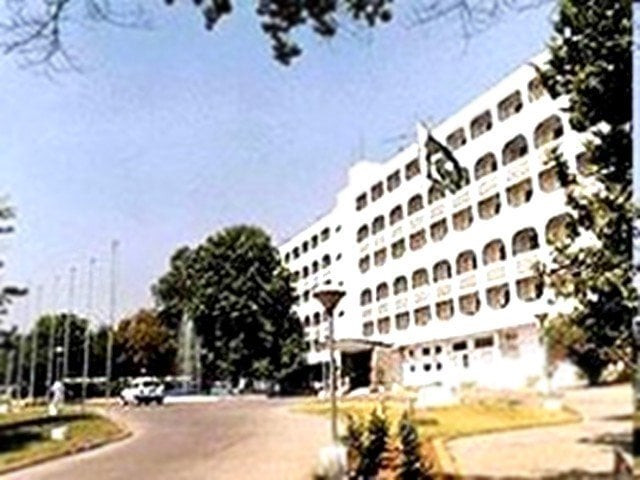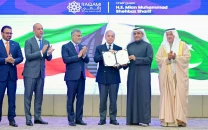Terror financing: US, UK move ‘aims at hampering economic progress’
Foreign Office terms efforts to place Pakistan in FATF grey list politically motivated

Pakistan Foreign Office. PHOTO: FILE PHOTO
The strongly-worded reaction from the Foreign Office came after the US and the UK jointly moved a motion before the Financial Action Task Force (FATF) to place Pakistan on its terrorist financing watchlist.
The FATF, an intergovernmental organisation that sets global standards against illicit finance, is set to meet next week to take up the motion jointly moved by the US and the UK and also backed by Germany and France.
Reacting to the development, Foreign Office spokesperson Dr Muhammad Faisal said Pakistan had “serious concerns over and objections to the introduction of this new procedure, which is unprecedented and in clear violation of established rules/practices of FATF”.
“Since 2015, time and again the goalposts have been shifted for reporting by Pakistan. This has made it into a never-ending monitoring process. The objective of raising these new issues seems to be to suddenly raise an alarm on the overall integrity of Pakistan’s AML/CFT framework.”
He further said the initiation of this action without waiting for completion of Pakistan’s Mutual Evaluation was designed to manipulate the FATF process.
“The real aim of this politically-motivated move is to hamper Pakistan’s economic progress,” the spokesperson told reporters.
US pushes motion to put Pakistan on global terrorist-financing watchlist
Giving background, Faisal said FATF is an international body established in 1989 on the initiative of the G7. The primary aim of FATF was to set standards to combat money laundering.
In 2001, its mandate was expanded to include countering terrorist financing.
Every country goes through a peer-based evaluation process called ‘Mutual Evaluation’ for monitoring of compliance with FATF standards.
Since Pakistan is not a member of FATF, the country’s Mutual Evaluation is conducted by the Asia Pacific Group (APG). FATF can take punitive measures against any country for non-compliance by issuing a public statement (black/grey list).
Based on Pakistan’s Mutual Evaluation in 2009, FATF identified ‘strategic deficiencies’ in Pakistan’s AML/CFT regime.
In February 2012, Pakistan was listed in FATF’s Public Statement i.e., ‘grey list’. To overcome the deficiencies, Pakistan agreed to implement FATF Action Plan.
As a consequence, the State Bank of Pakistan introduced new rules and guidelines on CFT/AML. Stand-alone legislation on Money Laundering was also enacted by parliament.
Moreover, an operationally independent and administrative Financial Monitoring Unit (FMU) was established under the AML law with the sole mandate of receiving, analysing and disseminating Suspicious Transaction Reports (STRs) and Currency Transaction Reports (CTRs).
Cabinet okays steps to block terror financing
In June 2015, after strenuous efforts, the implementation of the Action Plan was completed and Pakistan was de-listed from FATF’s Public Statement.
After the exit, the FATF referred Pakistan to APG due to residuary concerns regarding implementation of UNSCR 1267 sanctions on some entities, ie., (Lashkar-e-Taiba, JuD, and FIF).
The spokesperson said Pakistan had been continuously reporting to APG on those ‘residual concerns’.
The latest report concerning Pakistan was submitted to APG on January 6, 2018. The reports highlighted comprehensive enforcement actions undertaken by the government to address the concerns.
“While the APG was analysing our report, on January 20, 2018 the US and the UK jointly submitted a letter to the FATF, nominating Pakistan for placement in the grey list. France and Germany subsequently joined this nomination,” Faisal said.
Responding to the US Worldwide Threat Assessment Report in which US referred to Pakistan as a regional security risk, projecting that its nuclear and military buildup will imperil security of its neighbours, the spokesperson said Pakistan was still reviewing the report
“The singular negative focus on Pakistan’s nuclear programme is extremely unfortunate. We have consistently maintained that Pakistan’s nuclear posture is purely defensive, in order to deter the aggressive designs of its hostile neighbour in the east,” Faisal maintained.
He said complete silence of the report on India’s ambitious nuclear programme and delivery system was really surprising and smacks of partisanship.
“Any credible threat assessment should have cautioned the world about India’s fast growing nuclear stockpiles and development of long-range delivery systems that have ignited a new arms race in our region,” he said..
Govt decides to go tough on UN-banned outfits
Meanwhile, the spokesperson advised Afghanistan not to comment on internal matters of Pakistan after recent comment by Afghan President Ashraf Ghani on the sit-in over the killing of Naqeebullah Mehsud.
“We have seen the tweets by the Afghan leadership in the wake of a sit-in for the arrest of the accused in Naqeebullah Mehsud’s case. The Afghan leadership has tried to portray the sit-in in a different light.
The tweets are tantamount to interference in the internal affairs of Pakistan,” he said.
“It is unfortunate that the sit-ins in response to the case are being projected in a different light. The issue is that of a legal and administrative nature and any attempt to politicise it is unacceptable.
We believe this tendency should be avoided,” he stressed.



















COMMENTS
Comments are moderated and generally will be posted if they are on-topic and not abusive.
For more information, please see our Comments FAQ